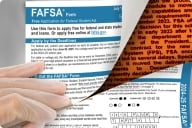You have /5 articles left.
Sign up for a free account or log in.

U of Michigan law school
A council of the American Bar Association voted Friday to lift the requirement that law schools use a test in the admissions process.
The Council of the ABA Section of Legal Education and Admissions to the Bar voted to lift the testing requirement starting in the fall of 2025. Currently the ABA permits the law schools it accredits to use either the Law School Admissions Test or the Graduate Record Examination.
The proposed revision, which could be a significant change in law school admissions, now goes to the ABA House of Delegates for approval. The next meeting of the House of Delegates is in February.
The council’s Strategic Review Committee studied the issue and released a report on all the comments received about the plan.
“Comments expressed concern that the revisions would jeopardize the benefits that the LSAT provides as an objective admissions indicator to ‘level the playing field’ for all applicants,” the committee, known as the SRC, said. “The SRC believes that these comments fail to appreciate how the LSAT and other admission tests are currently used. Law schools are not required to ascribe any particular weight to an admission test, and in fact schools consider the LSAT or other admission tests in various ways, including (in some cases) admitting students despite a relatively low test score. Because law schools vary in how they use the LSAT, there is not currently a ‘level playing field’ as suggested by these comments.”
Another issue the ABA report addressed was fear about a “race to the bottom” in which law schools abandon the test requirement and admit poorly prepared students. But the report said that “The SRC does not believe such a ‘race to the bottom’ is likely. As explained above, schools with low performance indicators (attrition, bar pass, assessment during law school, etc.) will remain free to adopt an admission test to bolster their admissions policies, and many likely will do so as a means of demonstrating that they are addressing those issues.”
During the council meeting, most members didn’t argue the pros and cons of the LSAT or GRE, and instead relied on the report.
Officials from ETS (which produces the GRE) and Law School Admission Council (with produces the LSAT) urged the council to reject the council report.
Kellye Y. Testy, president and chief executive officer of the Law School Admission Council, said the ABA council should favor “opening it up a little” and perhaps create other ways for some students to avoid testing, and to study the impact.
She said there has been “no real engagement” between the ABA council and those involved in law school admissions.
David Klieger, director of legal education at ETS, said that “scientific research” shows that test-optional admissions does not work.
And 60 law deans, fewer than one-third of the total, wrote to the council that they worried that the change would hurt minority applicants. They wrote that the change would “diminish the diversity of law schools’ incoming classes, by increasing reliance on grade point average and other criteria that are potentially more infused with bias. At the very least, we believe that more data and study on the effects of this precipitous change are needed.”
The deans added, “For if law schools abandon the LSAT (or some other validated test) in their admissions processes, something else will take its place. We do not know what those things will be, but it is quite possible—we think probable—that greater emphasis will be put on GPA, written or verbal recommendations, the reputation of undergraduate institutions, admissions officers’ familiarity with those institutions, or other subjective factors. Will reliance on these other criteria produce more or less racial, socioeconomic, or other forms of bias than exist under current admissions practices?”
Members of the ABA council said they weren’t concerned about the impact of the change on diversity because the highest scores on the LSAT are earned by white and Asian students. The lowest scores are earned by Black and Puerto Rican students.
Further, they stressed that law schools could go on requiring the LSAT.
How Will Things Change?
One discussion topic during the meeting was how much of a change the new rules would encourage.
As part of Kaplan’s 2022 law school admissions officers survey, in anticipation of this change, the company asked law schools what they might decide to do if the requirement were no longer in place. Of the 82 ABA-approved law schools that were surveyed in September and October:
- Thirty said their school would be very likely to continue requiring applicants to take an admissions exam.
- Eleven said their school would be somewhat likely to continue requiring applicants to take an admissions exam.
- Two said their school would be somewhat unlikely to continue requiring applicants to take an admissions exam.
- Two said their school would be very unlikely to continue requiring applicants to take an admissions exam.
- And the remaining 37 didn’t know what their school would do.








